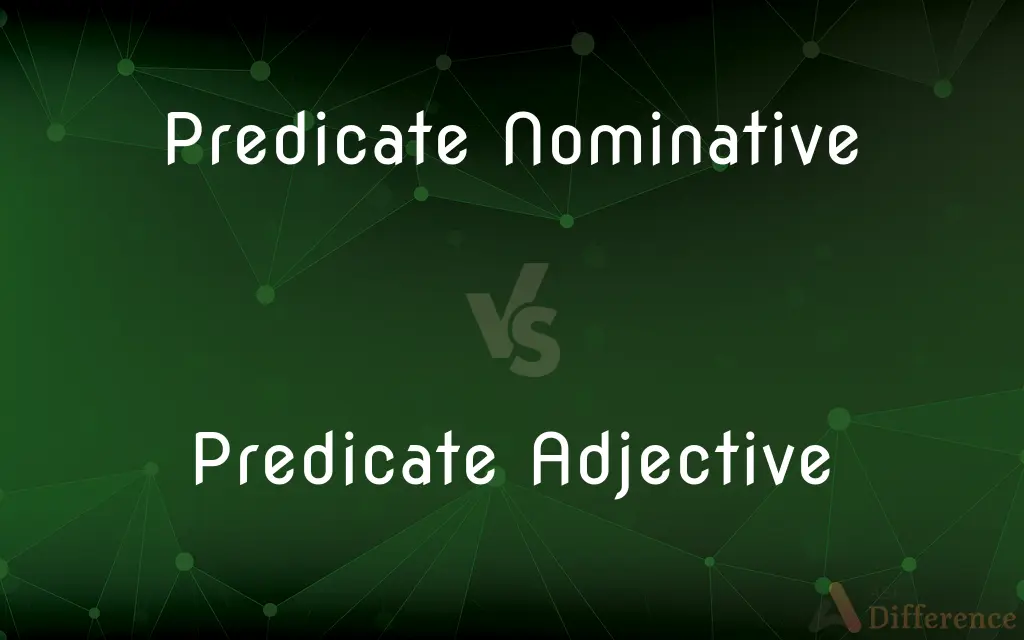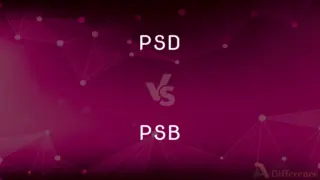Predicate Nominative vs. Predicate Adjective — What's the Difference?
By Tayyaba Rehman — Published on December 29, 2023
A Predicate Nominative is a noun or pronoun that follows a linking verb and renames the subject. A Predicate Adjective follows a linking verb and describes the subject.

Difference Between Predicate Nominative and Predicate Adjective
Table of Contents
ADVERTISEMENT
Key Differences
In the realm of grammar, both Predicate Nominative and Predicate Adjective play crucial roles in adding information about the subject of a sentence. The Predicate Nominative is essentially a noun or pronoun that comes after a linking verb and provides a second naming for the subject. This renaming process ensures that the subject and the Predicate Nominative refer to the same entity or thing.
Contrarily, the Predicate Adjective is an adjective that also follows a linking verb but serves to describe or give more information about the subject. Rather than renaming, the Predicate Adjective offers characteristics or qualities that pertain to the subject. It adds depth to our understanding of the subject by providing descriptive terms.
When exploring Predicate Nominative, it's evident that its primary function is to give clarity or additional context about who or what the subject is. For example, in the sentence "She is the captain," "captain" serves as the Predicate Nominative, highlighting the role or title of "she."
On the other hand, Predicate Adjective emphasizes the attributes or states of the subject. In a sentence like "The flowers are beautiful," the word "beautiful" is the Predicate Adjective, offering a description of "flowers." It doesn’t rename the flowers but gives a qualitative assessment.
Comparison Chart
Part of Speech
Noun or Pronoun
Adjective
ADVERTISEMENT
Function
Renames the subject
Describes the subject
Follows
Linking verb
Linking verb
Relation to Subject
Provides a second naming
Gives a characteristic or quality
Example Sentence
"She is the president."
"She is happy."
Compare with Definitions
Predicate Nominative
A noun or pronoun that renames the subject.
In My friend is the artist, artist is the Predicate Nominative.
Predicate Adjective
Offers characteristics or states of the subject.
The book is interesting, features interesting as the Predicate Adjective.
Predicate Nominative
Comes after a linking verb to provide a second naming.
The CEO is my father, where father acts as the Predicate Nominative.
Predicate Adjective
Gives a qualitative assessment of the subject.
The movie is thrilling, where thrilling is the Predicate Adjective.
Predicate Nominative
A grammatical element that identifies the subject in another way.
The victor was he, with he being the Predicate Nominative.
Predicate Adjective
Serves to add depth to our understanding of the subject.
The answer is correct, with correct being the Predicate Adjective.
Predicate Nominative
Serves to clarify or give additional context about the subject.
The best player is John, highlights John as the Predicate Nominative.
Predicate Adjective
An adjective that describes the subject post linking verb.
The sky is blue, has blue as the Predicate Adjective.
Predicate Nominative
Equates the subject to another noun or pronoun.
The winner is she, where she is the Predicate Nominative.
Predicate Adjective
Describes the subject using a linking verb.
The journey was long, uses long as the Predicate Adjective.
Common Curiosities
Is a Predicate Nominative always a noun or pronoun?
Yes, a Predicate Nominative is always a noun or pronoun.
Can one sentence have both a Predicate Nominative and Predicate Adjective?
Not simultaneously after the same linking verb. They serve different functions.
Are linking verbs always "to be" verbs?
Often, but not always. Other linking verbs include "seem," "become," "appear," etc.
Can a Predicate Adjective be more than one word?
Yes, it can be a compound adjective like "warm-hearted."
Can "it" be used as a Predicate Nominative?
Yes, in sentences like "The culprit was it," "it" is the Predicate Nominative.
How can I identify a Predicate Adjective in a sentence?
Look for an adjective after a linking verb that describes the subject.
Is "my sister" in "The teacher is my sister" a Predicate Nominative?
Yes, "my sister" acts as the Predicate Nominative.
Can "happy" in "They are happy" be a Predicate Nominative?
No, "happy" is an adjective, so it's a Predicate Adjective.
Do both always follow linking verbs?
Yes, both Predicate Nominative and Predicate Adjective follow linking verbs.
Can adverbs be Predicate Adjectives?
No, Predicate Adjectives are strictly adjectives.
Does a Predicate Nominative always refer to the same entity as the subject?
Yes, it provides a second naming for the subject.
What's the main difference between Predicate Nominative and Predicate Adjective?
Predicate Nominative renames the subject while Predicate Adjective describes it.
Is "They are friends" using a Predicate Nominative?
Yes, "friends" is a noun and renames "They," making it a Predicate Nominative.
Can a Predicate Adjective be negative?
Yes, like in "The news is unfavorable."
Why use a Predicate Nominative over a Predicate Adjective or vice versa?
It depends on the intended meaning: renaming the subject or describing it.
Share Your Discovery

Previous Comparison
PSD vs. PSB
Next Comparison
5w20 vs. 5w30Author Spotlight
Written by
Tayyaba RehmanTayyaba Rehman is a distinguished writer, currently serving as a primary contributor to askdifference.com. As a researcher in semantics and etymology, Tayyaba's passion for the complexity of languages and their distinctions has found a perfect home on the platform. Tayyaba delves into the intricacies of language, distinguishing between commonly confused words and phrases, thereby providing clarity for readers worldwide.












































